#and because people demonized him on the basis of being a narcissist instead of on the basis of being an abuser.
Text
narcissistic abuse isn’t real narcissistic abuse isn’t real narcissistic abuse isn’t real narcissistic abuse isn’t real narcissistic abuse isn’t real narcissistic abuse isn’t real narcissistic abuse isn’t real narcissistic abuse isn’t real narcissistic abuse isn’t real narcissistic abuse isn’t real narcissistic abuse isn’t real narcissistic abuse isn’t real narcissistic abuse isn’t real narcissistic abuse isn’t real narcissistic abuse isn’t real narcissistic abuse isn’t real narcissistic abuse isn’t real narcissistic abuse isn’t real narcissistic abuse isn’t real narcissistic abuse isn’t real narcissistic abuse isn’t real narcissistic abuse isn’t real narcissistic abuse isn’t real narcissistic abuse isn’t real narcissistic abuse isn’t real narcissistic abuse isn’t real narcissistic abuse isn’t real narcissistic abuse isn’t real narcissistic abuse isn’t real narcissistic abuse isn’t real narcissistic abuse isn’t real narcissistic abuse isn’t real narcissistic abuse isn’t real narcissistic abuse isn’t real narcissistic abuse isn’t real narcissistic abuse isn’t real narcissistic abuse isn’t real narcissistic abuse isn’t real narcissistic abuse isn’t real narcissistic abuse isn’t real narcissistic abuse isn’t real n
#vent/rant in tags#some people are JUST ABUSIVE.#i’m not gonna lie - it hurts so fucking bad to have done so much work all by myself - untreated - unmedicated - no resources -#just guesswork - just to have it not fucking matter because people discard me the SECOND they learn about my#TRAUMA BASED fucking disorder.#it’s not my fault. i was a CHILD. i was a CHILD who should have been cared for - not neglected - isolated - and abused.#i’m sorry that maybe some people take that and repeat the cycle - but everything about that told me that i HAVE to be BETTER -#i CANNOT repeat those same fucking behaviours that wounded me so deeply and ruined my fucking life#IT IS NOT MY FAULT.#and you know fucking what? my biggest abuser had NPD - and i rejected my diagnosis for YEARS. because of terms like narc abuse.#and because people demonized him on the basis of being a narcissist instead of on the basis of being an abuser.#rejecting my diagnosis only hurt me more - and hurt the people around me more.#i am so tired. i’m just a person. i am just a human being. i try so hard - i don’t even want recognition or praise for trying -#i’m just tired of being thrown away - i’m tired of being treated like my abuser just because of my diagnosis#he quite literally tried to murder me - believe me if you want - i don’t care - i was a child and he tried to murder me and i still think#that there is no excuse to demonize NPD just because he has it.#fuck all the way off - go die - i don’t care#none of my friends would ever know i have NPD because i’m not a fucking stereotype - i’m not an evil monster - i don’t want to hurt anyone-#the way i’ve been hurt - i NEED to be the best - i NEED to be as good as possible#stop demonizing my disorder - please - i am begging#screaming into the void#NPD#narc abuse#narcissistic abuse
5 notes
·
View notes
Text
Unpacking Rebirth!Talia’s Upbringing
Okay so…. Can we talk about Rebirth Talia al Ghul?
People who aren’t familiar with her history, her almost 50 year history at this point, and more importantly aren’t familiar with it in depth often have no idea why it is that Talia fans think that her treatment post Morrison, but even moreso post-Rebirth, is a radical rebranding of the character they’ve known for so long. And I could talk about that, and maybe one day I will, but today I’m going to talk about something different, but related.
I’m going to talk about Talia’s background in Rebirth, how it accounts for her being a dramatically different character than she was in her classic form and whether she’s still salvageable as anything other than a mustache-twirler.
I. The Demon’s Daughter
Let’s be clear: the little we know of Talia’s rebirth childhood is absolutely horrific. Pure nightmare fuel. While their traditional dynamic was troubling and problematic, it was also loving in its way, and Ra’s was controlling of her, while also protective of her. Now, instead, we have this:

This issue has been out for a while, but I haven’t seen anyone really unpack what it is Talia is saying here, because we’re all focused on the stupid swordfight with Selina. But look at what it is Talia is saying and what it means about her upbringing.
Talia is saying that, basically since she was a toddler, she has been physically abused, and forced to fight, by her centuries old swordmaster father. In fact, her very first memory is bleeding from wounds caused by her father. From then on, her life is a fight to survive against her own father, which I’m guessing was pretty damn difficult especially when she was an actual child. And often, when she loses?
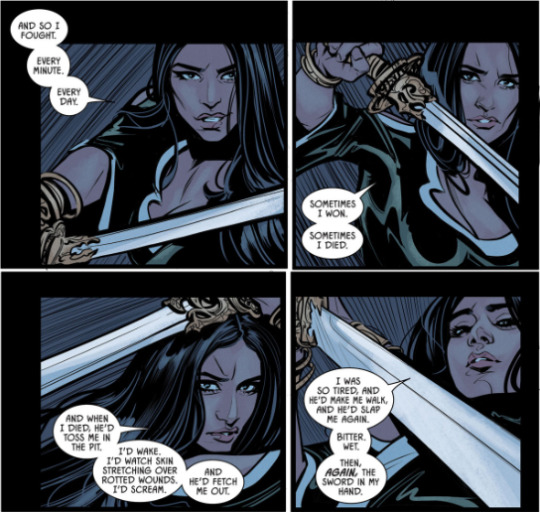
She dies. Or rather, she is murdered. Repeatedly. By her father.
And then he resurrects her and starts over.
And about those resurrections? It’s not like he just picks her newly killed body and immediately brings her back - check out that first panel on the second row. Not only is she killed and revived countless times, he lets her corpse at least partially rot before resurrecting her, so that when she returns to life, she is treated to the sight of her skin regrowing over her rotted flesh. And as soon as Ra’s notices she’s alive again… they start again.
How long did that go on? Unclear, but she’s still fighting him as a grown woman in the equivalent of this time period in The Gift...

...so I’m guessing the answer is “it didn’t stop until she left him.”
To be honest, I’m not really sure what the Rebirth version of Ra’s and Talia’s dynamic even was. The classic relationship doesn’t work at all with this backstory, and we’ve never really seen a lot of what the new paradigm might be since they’ve been out of contact since well before Rebirth. But what we do know is, she was an active assassin from a young age.

Unlike Classic Talia who was actually never an active assassin at all:

We can also glean bits and pieces of information regarding her Rebirth upbringing from other appearances. Over in Silencer, we find out that despite her brilliance, the fact that she was carrying out assassinations for him, and the fact that she could defeat her ancient swordmaster father even as a child, she was never good enough for him:

He was dissatisfied with her, and so he created metahumans using his genes to replace her. Ultimately, this drives her to plot against Ra’s because... who wouldn’t?
It’s not entirely clear what her ambitions were, specifically but judging from this bit of Batman and Robin (New52, but seemingly still canon for Damian’s backstory):
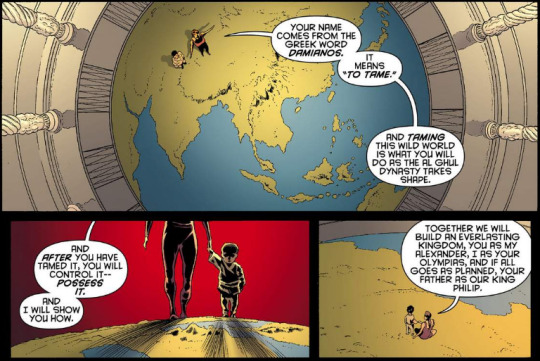
It involved winning Batman over to her side and ruling the world through Damian. This is further confirmed by her comment to Honor in Silencer Annual #1 here:

Where she indicates that Bruce is family to her, and still features in her future plans. What’s strange here is that she also says later that she intends to kill him personally, which is. Weird and out of nowhere, but what else is new. As a sidenote, Silencer is just strange because it ignores everything about Talia’s history not just in terms of changing her personality but in terms of ignoring the timeline of events, but... moving along...
Talia intends to form Leviathan to break free of him and pursue her own agenda. But, while apparently finding her insufficient, Ra’s cannot let her go. Not only that, he actively works to destroy everything she is trying to accomplish, including trying to kill Batman just because she desires him. In fact, he also tries to have Talia herself assassinated:
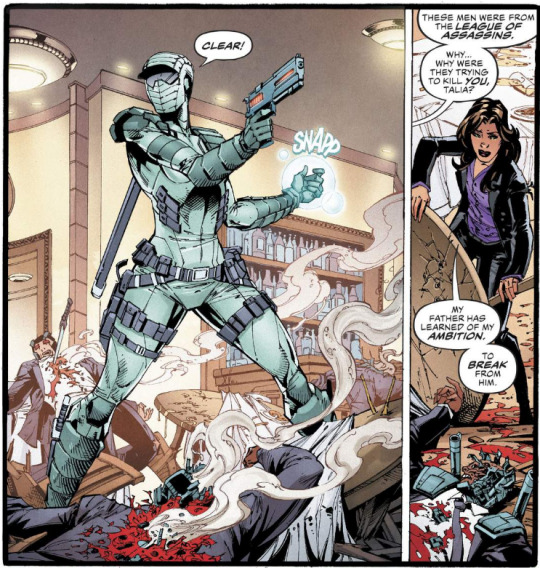
Another thing is, Rebirth Talia is rather older than she looks, as evidenced by her having been an adult when she met Honor.

Which means, in the end, we have a woman who was abused and repeatedly killed by her father, then thrown in a Lazarus Pit (but only after her body has lain around long enough to partially decompose!) and forced to repeat the cycle for who knows how long, but apparently quite a long time - decades, maybe centuries. Who even knows. She’s been working as an assassin since her teens. Despite her excelling and even surpassing him in various ways, he considers her inferior, and begins seeking to replace her with artificially created metahuman heirs. Eventually, Talia decides she wants to break with him, and he responds by first trying to destroy everything she cares about and then trying to have her killed.
OKAY, SO. Nightmare fuel. I genuinely can’t begin to imagine what it would be like growing up in that environment, and under the circumstances it’s certainly no shock that Rebirth Talia is warped.
Even so, what stands out to me in the B&R issue is that, initially, even her wildest ambitions required her to exercise power through a man – it’s just her son instead of her father or her potential husband. This says a good deal about how her upbringing, as well as her father’s fixation on marrying her off, has affected her self-image. And for those who say Talia evidences arrogance and self-importance… yes she does. Which is often a symptom of low self-esteem. In fact even Narcissistic Personality Disorder typically stems from overcompensation for a feeling of worthlessness.
The traditional/original Ra’s/Talia dynamic had some elements of this story, but not all and not nearly to the same extent. Furthermore, Classic Talia had something else - someone else - to love and look to for hope. Rebirth Talia does not. Because as far as I can tell, in Rebirth, Talia and Batman’s relationship has very little in common with the conflicted romance they shared in their original stories. And that’s how we transition to...
II. Beloved of the Bat?
So, Bruce Wayne.
Again, the extent of their relationship in Rebirth is unclear, but it definitely isn’t what it was pre-Rebirth.
The original Bruce/Talia story is basically as such: Talia meets him when she’s kidnapped by Dr. Daark, and falls in love with him. Bruce is also drawn and attracted to her. This results in Ra’s deciding to test Bruce for suitability as Talia’s husband and his own heir. Bruce passes, but unsurprisingly has no interest in running a criminal empire, though he does fall in love with Talia. This leads to a rather intense on/off romance that ultimately results in Damian Wayne, and continues until Tower of Babylon when Talia finally tires of being stuck between her father and her lover and breaks away from both of them. With Bruce and Talia’s relationship having been called to an end (by her, mind you – one day I may do a writeup on Bruce/Talia and how often what happened between them is misremembered by writers and readers alike), Bruce becomes involved with Catwoman in Hush. Even so, we see in Death and the Maidens that Bruce does still love Talia.

Meanwhile, Talia’s previously unknown sister Nyssa kidnaps and repeatedly murders and resurrects her (sound familiar?) until she more or less goes mad. By the end of the ordeal, she can barely speak, and she willing to do anything for Nyssa to avoid being killed again. This results in Talia disavowing her love for Bruce, which seems to be the catalyst for him to finally move on from her, though not without considerable pain.

Okay this is important to run down, because the Rebirth story has changed everything about their relationship.

Gotta love those evil expressions. It helps us remember that she’s a heartless monster.
Anyway so, In Silencer Annual #1, Silencer does note that Talia had previously said she was in love with Batman, so we know that she loved him, okay. But what does love mean to Rebirth Talia? We can find the answer to that if we go back to Roles of Engagement:
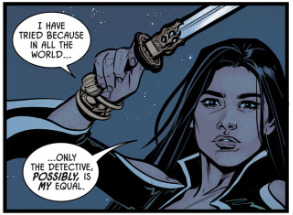
She “loved” him because she considered him a potential equal. That’s not really a bad basis for loving someone initially – and even Classic Talia’s love for Bruce was initially sparked from a place of admiration. But while Classic Talia eventually grew into a more complete love for him, it seems like Rebirth Talia is still stuck on objective: seek worthy mate. In fact, once it’s clear that she and Bruce are not coming back together, she just goes ahead and propositions Slade Wilson because she figures he can give her strong children, too:

Notably, this obsession with strong offspring sort of comes out of nowhere when Morrison takes over, but anyway, from that perspective it’s not hard to understand why Bruce’s feelings for her would also be somewhat muted in Rebirth:
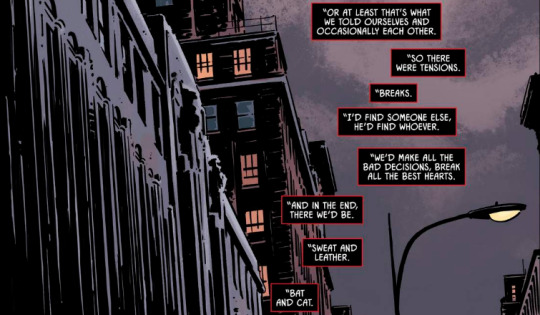
Because while Classic Bruce/Talia was a love story that stretched for over 30 years in our time, and most of their adult lives in canon… Rebirth Bruce/Talia is repeatedly presented as a short infatuation on his end, and a dangerous obsession with genetics on hers. The above panel is from Batman #66, and is part of the Knightmares arc, which is important because while it appears to be Selina saying it… it’s actually Bruce’s thoughts about the women in his life coming out through his imagined version of Selina. And to him, those women amount to nothing much – none of them even warrant a direct callout. Everyone besides Selina is a “whoever.”
Interlude and Sum I
So... Classic Ra’s was controlling, possessive and dismissive of her at times, but he was also devoted, protective and genuinely loving. The relationship was complicated and problematic but affectionate.
Rebirth Ra’s is an abusive tyrant who repeatedly murders and belittles his daughter and, when she decides to break from him, attempts to systematically destroy everything she cares about and then have her killed.
Classic Bruce/Talia was a complicated romance between two people who genuinely loved each other, but were always separated by circumstances. He loved her for years, and she loved him unconditionally, and they struggled over that from the day they met until they permanently separated as a result of her being brainwashed.
Rebirth!Talia went in search of someone she considered worthy of her so they could have a genetically perfect child to conquer the world with. Bruce briefly had feelings for her in a moment between romantic rounds with Catwoman.
My point is this: Rebirth Talia has never experienced genuine love or support from anyone in her life, or for anyone in her life. Her relationship with the two men she traditionally loved, and whose love for her has imprisoned, empowered and defined her for much of her existence as a character, was utterly gutted in Rebirth, leaving Rebirth Talia’s life as a prolonged emotional void. Which makes what comes next remarkable in some ways… and predictable in others.
Because this is where we talk about Damian.
III. Olympias to his Alexander
Now, I’m not going to get into the circumstances behind Damian’s conception because what the whole hell, there is absolutely no consistency there. Various people are very invested in one or another of the myriad versions of his conception that DC has repeatedly retconned and revised, generally leaning to whichever one fits their preferred personal narrative, and that’s fine but objectively? Absolutely no consistency, situation unclear. So let’s just go with “Damian resulted from this mess.”
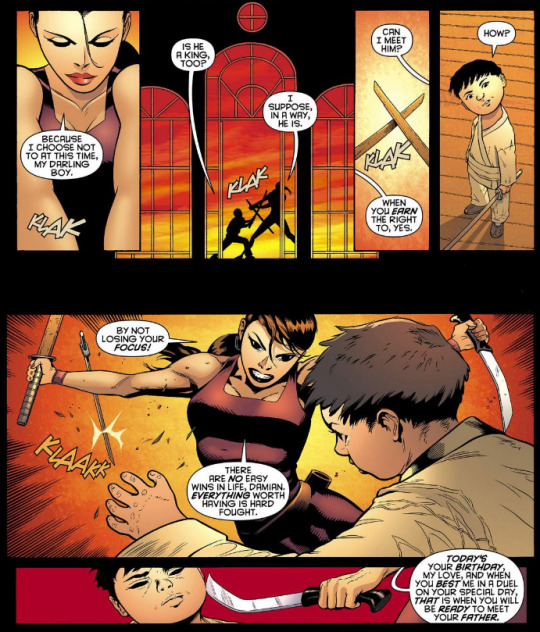
In Batman and Robin #0 we see that Talia basically raised him the way Ra’s raised her… with some major deviations. She used his desire to know his heritage and know his father’s name as the carrot to motivate him to succeed, rather than the fear of death and pain as a stick to punish him for failure.
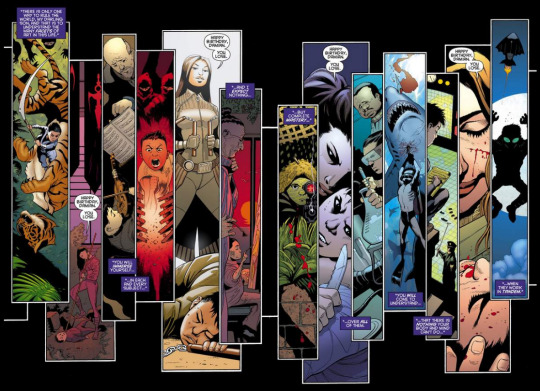
Talia does not kill her son, whom she duels with wooden blades rather than steel. And she is not shown to physically abuse him… aside from the swordfights, which of course is already bad.
Mind you, I’m not denying that his upbringing is still brutal. What I’m saying is, placed in the context of her own upbringing we can see that she was trying to raise him with more kindness and greater love than her father had her – an improved parental style, but still reflective of the only style she, herself, has ever known.
So it’s predictable that he’s essentially mistreated… because she literally has never encountered an emotionally healthy relationship and wouldn’t know how to raise him any differently even if she wanted to.
But it’s also remarkable because despite that, you can see she is trying to be a better mother than Ra’s was a father, and not let Damian grow up feeling unwanted and unworthy the way she did, herself.

Unlike Ra’s, she never tells Damian he is insufficient – on the contrary, she holds him up as the chosen, a conqueror, and dreams of a future when he will lead with both parents at his back. Remember, this is a woman who was never seen as worthy of inheriting Ra’s al Ghul’s organization, and she wants to make sure Damian knows the world is his to hold. The bit about having both parents is important, too, because per Batman Inc, Talia felt deprived of her mother, whom Ra’s had discarded as soon as she was no longer useful to him.
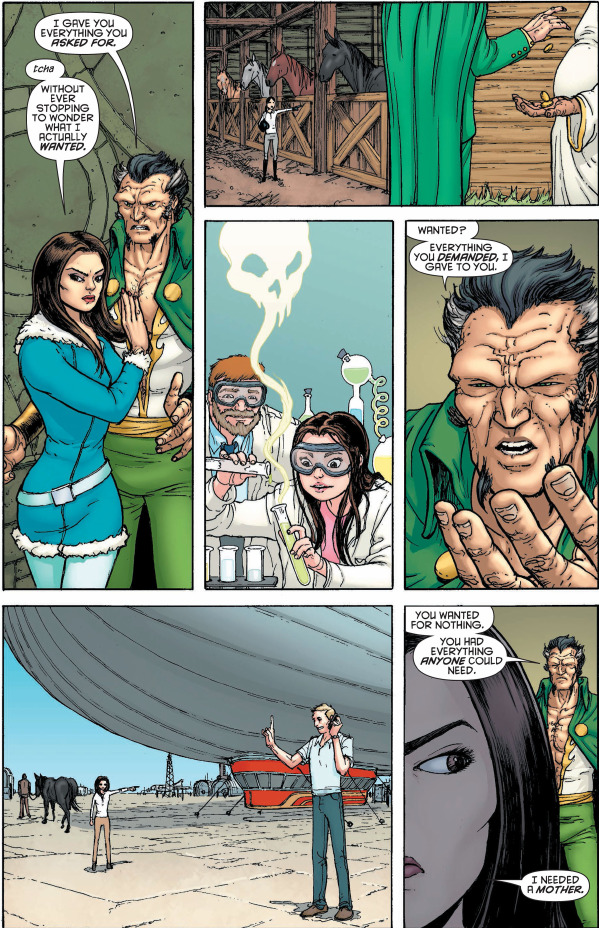
In short, she does for Damian everything she wished Ra’s had done for her.
But, in so doing, she falls into many of the same traps that Ra’s had fallen into: she doesn’t provide what Damian wants, or even what he actually needs. Instead, she gives him what he asks for, and what she thinks he needs. But for someone who grew up without love, trying to understand how to provide it is complicated, and difficult.
Anyway, when Damian finally defeats her, she fulfills her promise and brings him to meet Bruce. This involves a last ditch effort to unite their family: she offers to reform.
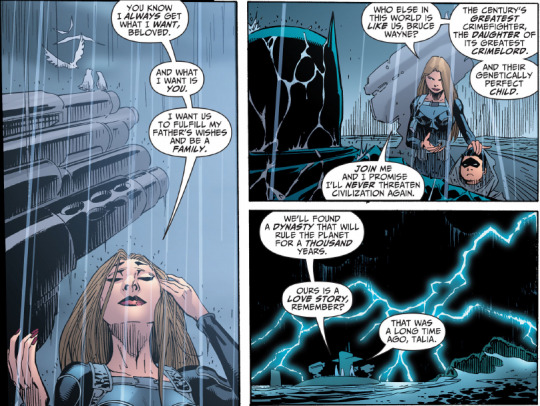
But not only does Bruce reject her, ultimately Damian does, as well.
This is, from Damian’s perspective, completely understandable. Who wants to live that kind of life? But from Talia’s perspective she has now been rejected by her own child, in addition to her father and the man she hoped to spend her life with. You can see the raw hurt this causes her clearly, as a woman who had always yearned for family starts having exchanges like this:
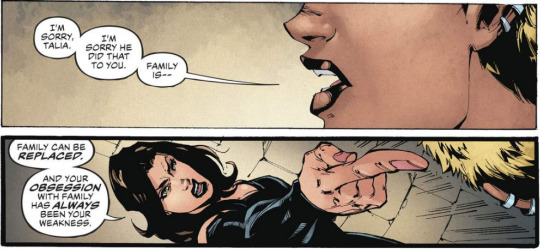
And while we’re at it, count Honor as another person who left her.

And to be clear here, I’m not saying they were wrong to leave her. Rebirth Talia is not a good person, not a kind person, not really anyone I’d want to willingly hang around. And yes, she’s clearly manipulating Honor with her affectionate words, although I’d argue this is largely because manipulation is all she's ever experienced and all she knows how to do.
So, what am I saying?
Interlude and Sum II - Why Is She Like That?
Just to catch it all up, we have a woman who was abused by her father, including being repeatedly murdered and resurrected, treated as inferior and insufficient despite being Ra’s’ equal or superior in many ways, who spent her young life performing assassinations and otherwise conforming her behavior to her father’s demands only to discover he was creating alternate heirs because she’s somehow still not enough for him. She has never experienced love, seemingly has no real understanding of what it is.
When she settles on someone she believes that she loves, she is ultimately nothing to him but a “whoever” - a temporary respite from the yo-yo relationship he has with another woman.
Then Damian happens and, from her perspective, she raises him with all the love, pride and approval that she herself never had. In an effort to unite the family, she also attempts to do what would please Ra’s - conform her behavior to Bruce’s preferences - but he still rejects her.
Meanwhile, she has “adopted” Honor Guest, whom she also shows favor to, but who also wants to leave her, and ultimately does just that, without even saying goodbye.
And then we have some. Quirks in her story - some specifics that really bear looking at in greater detail.
Repeated murder and resurrection: So how bad is that? It’s bad. The first time Talia experiences this kind of thing is in Death and the Maidens, which is probably no longer canon. But okay this was Classic Talia and for comparison, this breaks Talia’s spirit so completely that she essentially becomes Nyssa’s puppet.

She is literally never the same again, even after Nyssa is killed. In fact, it’s this that turned her into the monstrous Talia that we meet in Morrison’s run to begin with, so we already know she can be broken by this kind of treatment… but let’s use another example.
Let’s use… Batman.
He’s got one of the strongest wills in DC, right? Well, lets rewind to a story called Emperor Joker, where the Joker attained Mr. Mxyzpltck’s omnipotent powers which he uses to repeatedly torture and murder Batman and resurrect him every day.

This completely destroys Bruce to the point where the Spectre has to erase his memory of it in order to make Bruce functional as a person again.
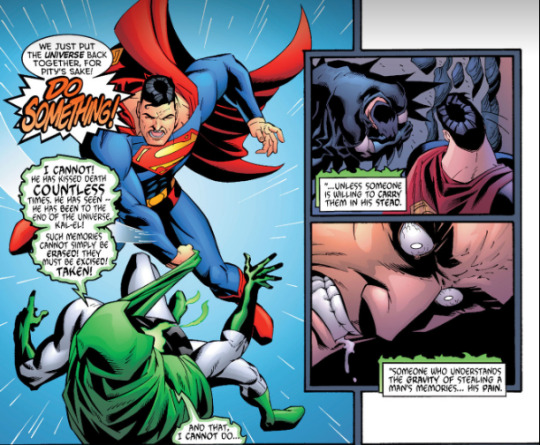
So imagine that happening to Talia, as a child, at her own father’s hands. And not for days, for years. And that’s without even considering the method of resurrection, which brings us to…
Lazarus Madness: Let’s talk about the Lazarus Pit. It’s a magical mystical ley line-powered bath that resurrects and heals. We all know that. But the thing is, that’s not all it does: it also drives the one bathed or healed mad. For a short time, they become superhumanly strong, and also overtaken with violent bloodlust. The first Lazarus pit was used to resurrect a sultan’s son, who promptly murdered Ra’s al Ghul’s wife Sora. Since then, Ra’s himself has been the primary beneficiary of its benefits, with interesting results… namely that Ra’s has been slowly going mad for centuries.

Because even though the intensity of the bloodlust and madness fades, it never completely disappears, and cumulative effect eventually twists a person’s nature beyond recognition. In his first life, Ra’s was a good-natured doctor, but over the many exposures he has found himself becoming progressively worse.
A quote from Denny O’Neil, Ra’s’s creator:
“...we gave Ra’s a benevolent motivation. You can certainly quarrel with his methods ... But Ra's is a loony bird. He’s been alive for 400 years and he’s become a maniacal sociopath.”
Dick Grayson concurs, and acknowledges its cause:
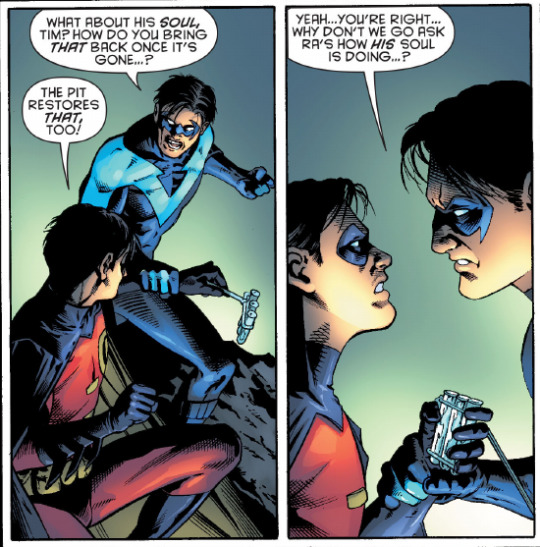
Even Ra’s himself is aware of it – this is why he didn’t want Jason bathed in the Lazarus Pit, because he is all too aware of the demons it stirs in a person.

So, what is the impact on Talia, who is quickly and repeatedly tortured and killed, and then resurrected using a method that is known to drive people insane? I’m going with “not the best.” It’s frankly astounding that she still resembles a human, psychologically.
Assassin work at a young age: While there has been a long-standing debate about the effects of exposure to violence on all people and children in particular, in general the consensus is, yes, exposure does cause desensitization. Obviously this doesn’t mean people are going to generally become serial killers because they played a violent video game, but it does have a numbing effect – just think about how people who watch enough horror films are harder to scare with horror films.
Now imagine that, instead of watching people murder and commit violent acts on television or on film, a child is instead expected to perform said acts themselves. How desensitizing would that be?
Frankly, to see all we need to do is look at Damian, who grew up under similar circumstances and, as a result, initially exhibits what I can only call red flag behavior.



The thing is, Damian isn’t so dissimilar from his mother in this regard. Like Talia, he becomes morally twisted, emotionally empty and ultimately tethered not to his own sense of morality or self but to other people’s perceptions and demands of him and who he should be. Before he meets Bruce, he adheres to the League’s expectations, and when he meets Bruce, he instead aligns himself with Bruce’s code of behavior, even though he does not actually believe in it. It takes a good deal of time and work for him to begin developing his own beliefs and boundaries. The difference between Damian and Talia is that he had Bruce and Bruce, despite his flaws, loved Damian enough to try for his sake.

Arguably, this is a defining difference between Classic and Rebirth Talia, as well. Classic Talia also viewed Bruce as her beacon and her path to salvation and hope.
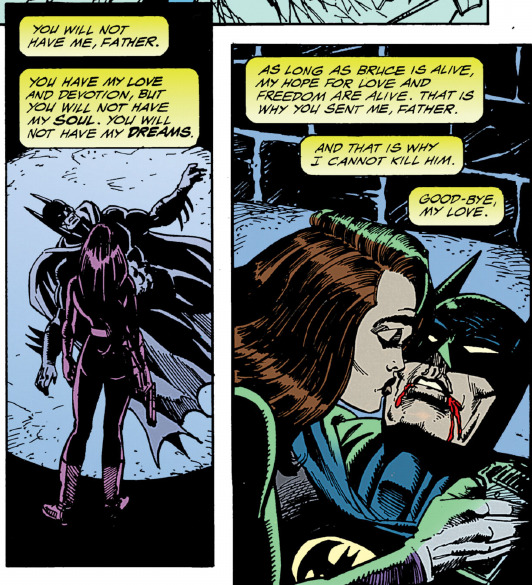
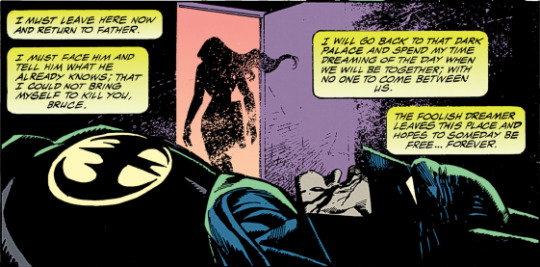
But if, in Rebirth, Bruce never really loved her, and in fact she barely loved him, then there is no catalyst for her to begin seeking another path. Rebirth Talia didn’t have anything but the League, and even Ra’s barely cared for her. As a result, she was boxed into her role by fate, which she acknowledges in Teen Titans, as she wishes better for her son than she had herself.

Anyway, obviously, there are no studies on the effect of taking assassin work as a child, but my general guess here is that she has a twisted understanding of the value of life and the significance of death. Which brings me to another massive issue that permeates the character and may even help explain her choice to put a hit on Damian at one point.
Death as Optional: Death is an inevitability, right? Like taxes. Nothing you do can prevent it, or reverse it, so all you can do is live with it, and make the most of what you have. It’s said that the existence of death is what lends meaning to life, and while I’m not sure I’m quite on board with that, the fact that death is permanent certainly does lend a certain gravitas to it. It’s also the reason we fear death and what lies beyond it.
Unless you’re an al Ghul.

For an al Ghul, death is opt in. Because Ra’s is essentially immortal (which is also a new thing, by the way) and because Talia herself has been repeatedly resurrected, as has her brother Dusan (assuming he’s still in continuity post-Rebirth), to Talia death has no weight to it. No gravitas. It is easily doled out, and just as easily forced into retreat.
Given that, it becomes exceptionally easy to threaten death, even to those she loves, because there’s nothing to say she can’t change her mind and take it back.
Now to be clear, my argument is not that she had the intention of taking it back – she didn’t really intend for Damian to die to begin with for one thing. It’s just that, because of who she is and what she has experienced, Talia would always act with the knowledge that she can choose to endanger someone’s life and think about whether she’s comfortable with the result (their being dead) later.
This is evident in both Ra’s and Talia, each of whom are willing to use death and resurrection as a tool to restructure people they don’t even want dead, as Ra’s attempts to do with Damian and Talia, and as Talia does with Honor Guest.

…as a sidenote can I just say that the Lazarus Pit’s effects are so weird. In some stories it can’t resurrect at all, and in others it can resurrect after decades without a problem. In some it just reduces age, and in some it also heals memories. Here it’s being used to erase memories, which makes no sense since a Pit his how Jason Todd got his memories back. Also, this is the first I’ve ever heard of al Ghuls having especially strong resistance to the Pit’s corrosive effects on personality. Considering it’s just a bunch of chemicals on a ley line, I’m not sure how that would work, but now I’m just imagining Ra’s with a book of Lazarus recipes like, Well, I’m needing one that restores memories today so Ima add an extra pinch of ginko.
ANYWAY.
V. “R” Stands for Redemption
There was a time, a few years back, when Damian had his own series, Robin: Son of Batman. And therein, you see one of the few efforts to explain and redeem Talia’s character. There, while she was still presented as colder and more aggressive than her Classic counterpart, she was still capable of compassion, protectiveness and love.
It was essentially explained as a result of her being cleansed of the toxin that was Ra’s al Ghul’s influence, via having darkness physically removed from her body.

Now, to be honest, I’m not sure how I feel about that particular route – I feel like it would have been more honest to have her resurrection heal the Lazarus damage, for example, but it’s a start. And, in the end, Damian left her with the chance to redeem herself and earn back his and Bruce’s trust.
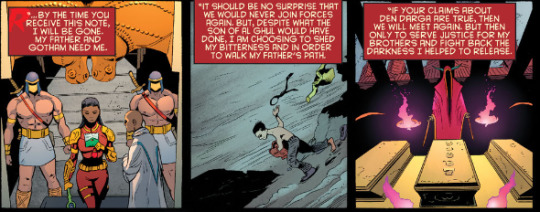


Aaaand she has failed. Or more precisely, writers have failed to follow up on this thread, and have instead doubled down on her as the evil Dragon Mother. I’ll be honest, I’m not really sure what’s going on with DC’s fixation on evil Asian ninja moms but I’m just going to… pretend that isn’t a thing in order to suggest some paths that could salvage her character.
I’ve seen it said that she’s been too evil for too long to be redeemed, but honestly that’s pretty silly. First of all these are comic books, anyone can be redeemed. The same writer who wreaked havoc on Talia also had Magneto, a Holocaust survivor, going full Nazi on humans, which was incredibly out of character, and Marvel basically fixed it by saying “guess who that wasn’t? Magneto. It wasn’t Magneto.” Technically DC could just Hal Jordan her, or let the rumored upcoming continuity shuffle bring her previous history back. As for the “been this way too long” argument, I mean she was Original Flavor Talia for more than twice as long and that wasn’t too long for DC to flip her entire motivation and personality. Catwoman was a villain for decades, and yet here she is, protecting people, making out with Batman on rooftops and leaving him at the alter for altruistic reasons. Same with Ivy, except for the parts about Batman, soooo… you know….
Anyway. I’m going to work with the assumption that we have to use what we have, and that we’re trying to get her to something like her pre-Morrison personality.
The first thing she would need is the experience of love. Someone to anchor her, who won’t judge her or abandon her even when she’s in a dark mood. Even when she’s showing her pain and her anger. Someone who recognizes how broken she is, but decides to try to help her rather than rejecting her. Someone who, in essence, will do for her what Bruce did for Classic Talia, and what he does for Damian in his flawed way.
Now, I’m a massive Bruce/Talia shipper, no lie. However, I do not think Rebirth Bruce and Talia have the kind of connection that could provide her this essential first need. Someone like Superman or Wonder Woman would probably be a better choice, simply because they have greater warmth of character and a drive toward helping lost souls.
After that, she would need some good old fashioned redemption time. Maybe a miniseries where she goes Xena on the world: a redemption quest. Maybe joining a team like the Outsiders or the Suicide Squad where she can earn her way back from the brink. The Outsiders would be cool, especially, because it would allow Bruce and Damian to monitor her and judge her as she progresses.
…and I mean, from a character perspective that’s all she really needs. From a writing perspective, she needs a writer who will nail down things like where Damian came from without going back to the drug-and-rape well, which was a retcon to begin with and has been retconned out and then back in over and over again. And most importantly, she needs a writer who has the interest in exploring her internal world to the point where they can actually draw these things out of her instead of just ignoring the fridge-horror implications of things like… the way she was raised.
If we could get these things to coincide, then Talia, too, can be saved!
Or we could just reboot the timeline again, whatever.
Anyway, that’s all folks, thanks for reading this far, I have no idea how you did. If you’re interested in this kind of thing, feel free to drop me a line and ask me… whatever, because God knows I have plenty to say about Talia and about comics in general.
In closing, something to remind us of the character we’ve lost.


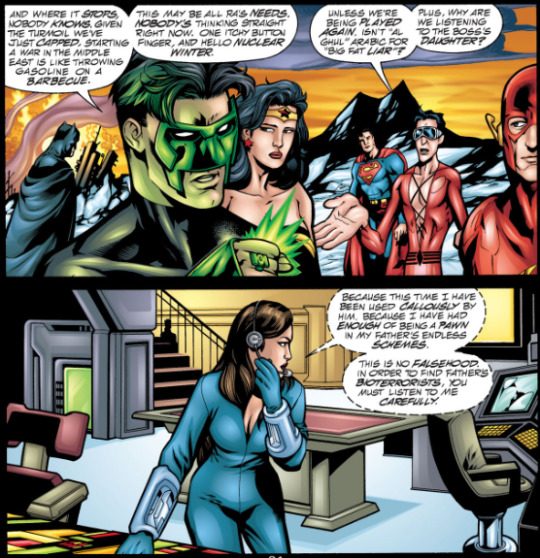

Until next time!
104 notes
·
View notes
Text
The Half Stupid
Stupid people are usually too stupid to know they’re stupid. Ignorance can be bliss for them. Alas, the half-stupid aren’t nearly so lucky. They’re smart enough to know they’re not that smart, but too lazy to do anything about it. Perhaps this is why they’re so often attracted to the cheap moralism and silly simplicity found in reductive ideologies. These are, after all, fundamentally lazy people, TED-talk watching skim-readers, who secretly can’t remember the last time they read a serious book cover-to-cover.
Ideology is the fig leaf the half-stupid use to conceal their essentially shallow understanding of the world. It’s what allows them to have an opinion about everything, despite having an in-depth knowledge of practically nothing. The notion of epistemic privilege, so central to the identity politics of our age, is especially attractive to the half-stupid, as it allows them to further avoid the difficult task of thinking (e.g., I know, in advance, that whatever this white guy says is wrong because of who he is; just as I know, in advance, that whatever this indigenous woman says is right because of who she is).
The moral grandstanding of the half-stupid is surely fired, to some extent, by a love of justice; but it’s fired, too, by petty resentments and an anti-intellectual hatred of thinking. Just as less successful siblings often console themselves with the belief that they’re cooler than their more successful siblings, the half-stupid often console themselves with the belief that they’re more moral than us.
*
I know sociology profs who can talk about systemic social problems, like sexism and racism, without making any of their students feel like group representatives. They can do this because they’re intellectuals, first and foremost. They can do this because they’re adept at dealing with the paradoxical nature of reality. They can do this because they’re good at binocular thinking: at seeing “the forest” and “the trees” at one and the same time. Alas, half-stupid profs aren’t nearly so good at this. A former student of mine experienced this first-hand last year at Concordia University.
She wears the hijab. And this makes her rather obviously Muslim. A well-meaning progressive prof—who, as she puts it, “talks about privilege all the time”—calls upon her in class whenever they’re talking about anything remotely related to Islam (e.g., Islamophobia, I.S.I.S., women in Islam, etc.). As you might expect, being habitually treated like a group representative makes her profoundly uncomfortable. Makes other students uncomfortable too. The same prof calls on black students for “the black perspective” on a regular basis, much to their chagrin, and she systematically silences young white men who dare to “take up too much space.” She never seems to remember her students’ names. What a surprise.
*
When your ideas about the world have evolved, sometimes painfully, over the course of decades—through trial and error, mistakes, reflection, reading, learning—it’s incredibly insulting to have someone imply that your politics are a mere function of your biography. And yet it’s hard to deny that the two are interconnected. For instance, I was disappointed to learn, in Rüdiger Safranski’s Nietzsche: A Philosophical Biography (2003), that most of Nietzsche’s deep-seated hatred of antisemitism was based, not so much on general principle, as on his visceral contempt for his virulently antisemitic brother-in-law.
In his outstanding article on antislavery activism in The Journal of Southern History (November 1990)—“The Experiential Basis of the Northern Antislavery Impulse”—historian John Huston demonstrates that the vast majority of those who joined the antislavery cause did so, not because they were convinced by a detached, theoretical, Enlightenment critique of the institution of slavery, but rather because they were radicalized by a visceral, traumatizing experience, wherein they were exposed, usually by accident, to the brutality and violence of slavery up-close-and-personal (e.g., watching a drunken slaveholder beat his slave to death whilst vacationing in Newport).
*
Humanities profs love to go on and on about how they teach critical thinking. But if you ask them what critical thinking is, you’ll invariably get a garbled, fuzzy response. The root of the problem, to my mind, is that critical thinking can’t be taught. Not directly. Because it’s an emergent property of a process. Critical thinking is a byproduct of perspective. At their best, the Humanities provide us with much needed perspective on what is. But what students do with that perspective is up to them.
The worst Humanities profs are, in essence, Sunday School teachers teaching a catechism class. These are, in my experience, precisely the profs who go on and on about how they’re teaching their students critical thinking. By contrast, the best Humanities profs do not seek to indoctrinate their students; they merely seek, instead, to provide them with perspective. There are various ways to do this. The study of history is perhaps the best. Regardless, before you can think critically about what is, you must first think about what was, what is elsewhere, and what might be. Without a point of comparison, thinking critically is quite literally impossible. A fish must first realize he’s swimming in water before he can think critically about water.
*
Real intellectuals surprise you from time to time. They praise something you didn’t expect them to praise. They attack something you didn’t expect them to attack. And they change their minds occasionally. For instance, an old friend of mine recently jettisoned his longstanding skepticism concerning climate change. His reasons for doing so were thoroughly intellectual: “I used to be a ‘climate skeptic’ until I realized that the argumentative patterns of ‘climate skeptics’ are the same as that of ‘Holocaust Revisionists.’ While I can’t do climate science, I can do pattern recognition.” Alas, dogmatic people never surprise you like this. All to the contrary, the dogmatic person’s position on pretty much any subject is entirely predictable—indeed, tediously and nauseatingly predictable.
An old college buddy of mine is a case in point. He was always quite politically conservative, even when we were in undergrad, but he was an intellectual back then, first and foremost, and that made arguing with him till three in the morning thoroughly delightful, regardless of our differences. But arguing with him is no longer delightful. He’s become dogmatically neoconservative in middle age, and, as a consequence, conversation with him has become pointless, repetitive, and boring—despite the fact that he’s extremely well-read and highly intelligent.
On good days, talking to him is like talking to an answering machine that answers all questions with one of ten prerecorded responses; on bad days, it’s like talking to a doctor who prescribes the same three prescriptions to all of his patients, all day long, regardless of what they say to him. He used to be a conservative intellectual. Now he’s just a conservative.
*
An ideologue is a person possessed by an idea; a philosopher is a person in possession of a few ideas. This is precisely why philosophers who disagree about religion or politics can be friends, whilst ideologues cannot. The ideologue’s inability to brook disagreement is rooted in his inability to see himself as anything other than the incarnation of an idea. When you challenge an ideologue’s idea, it’s an existential threat: you’re challenging everything that he thinks he is. By contrast, the philosopher cannot be reduced to her ideas. And she knows it.
*
Plato was acutely interested in sociological categories and psychological types. All of the major human types are captured and cataloged in his dialogues with cold-eyed precision. The charming host of The Symposium is a case in point. Agathon is a type: an intellectual lightweight, with a flair for language, who’s smart enough to suspect that he’s not all that smart, a good-looking guy who loves pretty things and doesn’t care if they’re real, the sort of guy who values beauty far more than he’s ever valued truth.
Eryximachus, the annoying doctor in The Symposium, is also a familiar type: an overbearing know-it-all with a stick up his ass and a PhD in Being Boring, a narrow-minded expert who seems to know everything there is to know about the little fenced-in patch of intellectual property he calls home, but practically nothing about the world outside of it.
Phaedrus is also a type: a self-absorbed narcissist who celebrates love, not because he’s a romantic, but because he’s noticed that people do lots of nice things for you when they’re in love with you. These are flawed characters. No doubt about that. Agathon is a bit of a tool, Phaedrus is a bit of a dick, and Eryximachus is a bit of a douche; and yet you can’t help but like all of them. Because they’re so much more than just types.
Like all of Plato’s characters, these guys are thoroughly human, entirely believable, and utterly unforgettable. These aren’t cardboard cut-outs or sock puppets; these are real people, people you recognize. You never forget their humanity when they’re in the midst of a heated debate, regardless of whether or not you agree with them. Alas, the same cannot be said of a heated debate in Social Media Land. We slip into demonization and nastiness far too easily there.
My friend Jean-Louis says this is an inescapable feature of the electronic medium. And maybe he’s right. Maybe it’s just too easy to be an asshole online. Regardless, the sociological paradox Plato resolved long ago remains unchanged. It sits there on the path before us like a stumbling block. We can’t get around it. So we might as well face up to it.
To study people as a group, we have to place them into categories: individuals must cease to be individuals. They must become representatives of this or that category. If you want to know humanity the way an entomologist knows butterflies, you’ll have to learn how to see forests not trees. But if you want to be a decent human being, who treats people with respect, you’ll have to learn how to see trees not forests. Because people are not butterflies. And few things are more dehumanizing than being treated like the representative of a category. Individuals want to be treated like individuals.
Plato figured out how to talk about the complicated relationships between people and power, ideas and institutions, without dehumanizing us. We’ve yet to figure out how to do this in Social Media Land.
—John Faithful Hamer, Being a Philosopher in Social Media Land (2017)
https://committingsociology.com/2017/11/29/the-half-stupid/amp/?__twitter_impression=true
0 notes